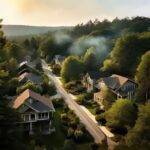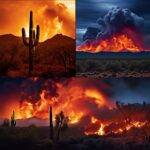Increasing Wildfires in the Northwest
Wildfire seasons in the Northwest have significantly increased, turning smoke into a common feature of summer months. Recent studies reveal that these wildfires have reversed years of air quality improvements in the region.
Contributors to Rising Wildfires
Several factors contribute to the increasing frequency and intensity of wildfires, leading to more smoke. Among these are climate change, which dries out the fuels; fuel buildup in forests; and human activities in forested areas. Experts emphasize the growing concern about the worsening smoke situation across North America.
Health Impact on Local Communities
At Overlake Medical Center in Bellevue, healthcare professionals report a rise in patients with respiratory conditions such as asthma and chronic obstructive pulmonary disease (COPD) during wildfire seasons. The influx of patients has significantly increased, highlighting the detrimental impact of poor air quality on lung health.
Environmental Regulations and Air Quality Setbacks
Despite the Environmental Protection Agency’s (EPA) regulations aimed at improving air quality, wildfires have negated two decades’ worth of progress in the Western region. Wildfire smoke, with its fine particles, poses a severe health risk as it can penetrate deep into the lungs and enter the bloodstream.
Preparing for Wildfire Season
Experts recommend that residents take proactive measures to prepare for wildfire seasons. Simple preparations like adding an air purifier or using a box fan fitted with a filter can significantly reduce indoor air pollution. Awareness and early discussions with healthcare providers are crucial, especially for those with preexisting respiratory conditions.
Visualizing Pollution Impact
A study from the University of Iowa highlights the areas with the worst black carbon pollution in the country, with parts of Washington, Oregon, and Idaho prominently on the list. This data underscores the severe pollution problem exacerbated by frequent wildfires.
Key Takeaways for Residents
- Proactive Health Management: Individuals with respiratory issues should stay informed and consult their healthcare providers ahead of wildfire seasons.
- Home Preparations: Investing in air purifiers or cost-effective alternatives like box fans with filters can help mitigate the impact of smoke.
- Awareness and Adaptation: Understanding the health risks associated with wildfire smoke and staying prepared can significantly improve health outcomes.
Addressing Wildfire Smoke Impact
The growing frequency of wildfires poses a significant challenge to public health and air quality in the Northwest. By taking proactive steps and staying informed, residents can better manage the health risks associated with poor air quality during wildfire seasons.
Download The Local News App to stay updated on local news and receive timely information on air quality and other critical updates. Click download on the prompt to get started.









Leave a Reply